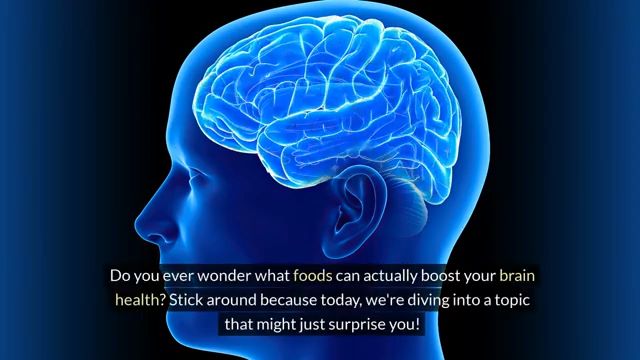Have You Been Neglecting Your Brain’s Favorite Food?

Last month, I found myself staring blankly at my computer screen, struggling to remember a crucial detail for a presentation. As someone who’s always prided myself on mental sharpness, that moment of cognitive fog was concerning. After some research, I discovered a simple reason: my diet was severely lacking in omega-3 fatty acids, nutrients essential for brain function.
Many of us focus on eating for our waistline or heart health, but what about the three-pound universe between our ears? In today’s fast-paced world, our brains face constant challenges, from digital overload to stress. Yet most of us don’t consume enough omega-3s, the building blocks our brains desperately need to function optimally.
If you find yourself forgetting things more often, struggling to focus, or experiencing mood swings, your brain might be sending you an SOS signal. The good news? The solution might be as simple as what’s on your plate.
What Are Omega-3 Fatty Acids and Why Are They Critical for Brain Health?
Omega-3 fatty acids are essential fats that your body cannot produce on its own; you must get them through your diet. For brain health, three types matter most:
- EPA (Eicosapentaenoic acid): Reduces inflammation and supports mood regulation
- DHA (Docosahexaenoic acid): Forms a significant portion of brain structure and supports neural communication
- ALA (Alpha-linolenic acid): Found in plant sources and partially converts to EPA and DHA
These powerful fatty acids are integral components of cell membranes throughout your body, with DHA being particularly concentrated in your brain and eyes. DHA alone makes up about 30% of the structural fat in your brain!
The Brain Benefits: What Happens When You Get Enough Omega-3s

Research shows that adequate omega-3 intake supports:
- Enhanced Memory: Omega-3s help maintain the health and function of brain cells involved in memory storage and retrieval.
- Improved Focus and Concentration: These fatty acids support the efficient transmission of signals between neurons, helping you stay on task.
- Better Mood Stability: EPA, in particular, has been linked to balanced mood and reduced symptoms of depression.
- Protection Against Age-Related Cognitive Decline: Regular consumption of omega-3s may help preserve cognitive function as you age.
- Reduced Brain Inflammation: Omega-3s help combat neural inflammation, which has been linked to various brain disorders.
Warning Signs: What Happens When You Don’t Get Enough Omega-3s

When your diet lacks sufficient omega-3s, your brain function may suffer in several ways:
- Memory lapses become more frequent
- Concentration becomes more difficult
- Mood swings may increase
- Mental fatigue sets in more quickly
- Processing information takes longer
Additionally, research suggests that chronic omega-3 deficiency may contribute to more serious cognitive issues over time, including accelerated brain aging.
Top 10 Omega-3 Rich Foods for Optimal Brain Function
1. Salmon

Why it’s a brain superfood: Salmon is packed with both EPA and DHA, the most beneficial forms of omega-3s for brain health.
Omega-3 content: A 3.5 Oz (100g) serving contains approximately 2,150 mg of combined EPA and DHA.
Brain benefits: Salmon’s high DHA content directly supports brain structure and neural communication, while its EPA content helps reduce inflammation that can affect cognitive function.
How to enjoy it: Bake with lemon and herbs, grill with a simple seasoning, or add smoked salmon to your breakfast.
2. Mackerel

Why it’s a brain superfood: This fatty fish offers one of the highest concentrations of omega-3s among all food sources.
Omega-3 content: A 3.5 Oz (100g) serving provides about 4,580 mg of EPA and DHA combined.
Brain benefits: The exceptional omega-3 content in mackerel supports overall brain health and function, plus it contains vitamin B12, essential for nerve function and neurotransmitter formation.
How to enjoy it: Try it grilled, smoked, or in fish cakes.
3. Sardines

Why it’s a brain superfood: These small fish deliver big brain benefits in a convenient, affordable package.
Omega-3 content: A 3.5 Oz (100g) serving offers approximately 982 mg of EPA and DHA.
Brain benefits: Beyond omega-3s, sardines provide vitamin D and calcium, which work together to support healthy brain cells and neurotransmitter synthesis.
How to enjoy it: Eat them on whole-grain toast, add to pasta dishes, or include in salads.
4. Flaxseeds

Why it’s a brain superfood: The richest plant source of ALA omega-3 fatty acids.
Omega-3 content: One tablespoon (10.3g) contains about 2,350 mg of ALA.
Brain benefits: While the conversion rate from ALA to EPA and DHA is relatively low, flaxseeds still contribute to overall omega-3 intake and brain health.
How to enjoy it: Sprinkle ground flaxseeds on oatmeal, yogurt, or smoothies.
5. Chia Seeds

Why it’s a brain superfood: These tiny seeds pack a powerful omega-3 punch for plant-based eaters.
Omega-3 content: One ounce (28g) provides approximately 5,050 mg of ALA.
Brain benefits: Beyond omega-3s, chia seeds offer fiber and protein that help stabilize blood sugar levels, which is important for consistent cognitive function.
How to enjoy it: Make chia pudding, add to smoothies, or use as an egg substitute in baking.
6. Walnuts

Why it’s a brain superfood: Not only do they physically resemble a brain, but they also nourish it!
Omega-3 content: One ounce (28g) contains about 2,570 mg of ALA.
Brain benefits: Walnuts provide omega-3s along with antioxidants that help protect brain cells from oxidative damage and inflammation.
How to enjoy it: Eat as a snack, add to salads, or incorporate into baked goods.
7. Hemp Seeds

Why it’s a brain superfood: A complete protein source that also provides beneficial ALA omega-3s.
Omega-3 content: Three tablespoons provide approximately 3,000 mg of ALA.
Brain benefits: The combination of omega-3s and complete protein makes hemp seeds excellent for neurotransmitter production and brain cell repair.
How to enjoy it: Sprinkle on salads, stir into yogurt, or blend into smoothies.
8. Edamame

Why it’s a brain superfood: These young soybeans offer plant-based omega-3s along with protein and fiber.
Omega-3 content: One cup provides about 560 mg of ALA.
Brain benefits: The combination of omega-3s, protein, and fiber helps maintain stable blood sugar levels, which are essential for consistent cognitive performance.
How to enjoy it: Steam and sprinkle with sea salt for a snack, or add to stir-fries and salads.
9. Seaweed

Why it’s a brain superfood: One of the few plant sources that contains DHA omega-3s.
Omega-3 content: Varies by type, but nori, spirulina, and chlorella are good sources.
Brain benefits: Seaweed provides DHA directly (without conversion from ALA) and contains iodine, which is essential for thyroid function and cognitive development.
How to enjoy it: Use nori sheets for sushi, add dried seaweed to soups, or try seaweed snacks.
10. Brussels Sprouts

Why it’s a brain superfood: These cruciferous vegetables provide plant-based omega-3s and other brain-supporting nutrients.
Omega-3 content: One cup contains about 135 mg of ALA.
Brain benefits: Brussels sprouts offer omega-3s along with vitamin K, which is essential for brain cell growth and efficient neural signaling.
How to enjoy it: Roast with olive oil and garlic, shred into salads, or sauté as a side dish.
Convenient Omega-3 Food Comparison Table
| Food | Serving Size | Omega-3 Type | Amount (mg) | Additional Brain Benefits |
| Salmon | 3.5 oz (100g) | EPA & DHA | 2,150 | Vitamin D, B vitamins |
| Mackerel | 3.5 oz (100g) | EPA & DHA | 4,580 | Vitamin B12, selenium |
| Sardines | 3.5 oz (100g) | EPA & DHA | 982 | Calcium, vitamin D |
| Flaxseeds | 1 Tbsp (10.3g) | ALA | 2,350 | Fiber, lignans |
| Chia Seeds | 1 oz (28g) | ALA | 5,050 | Fiber, magnesium |
| Walnuts | 1 oz (28g) | ALA | 2,570 | Vitamin E, antioxidants |
| Hemp Seeds | 3 Tbsp | ALA | 3,000 | Complete protein, GLA |
| Edamame | 1 cup | ALA | 560 | Protein, folate |
| Seaweed | 1 sheet of nori | DHA | 50-100 | Iodine, fucoxanthin |
| Brussels Sprouts | 1 cup | ALA | 135 | Vitamin K, antioxidants |
How to Include More Omega-3s in Your Daily Diet
Breakfast Ideas
- Chia seed pudding topped with walnuts
- Smoothie with ground flaxseed and hemp seeds
- Omelet with smoked salmon and spinach
- Yogurt parfait with walnuts and ground flaxseeds
Lunch Ideas
- Sardine salad sandwich on whole-grain bread
- Quinoa bowl with edamame, hemp seeds, and vegetables
- Salmon patties with mixed greens
- Walnut and chickpea salad with olive oil dressing
Dinner Ideas
- Grilled mackerel with roasted Brussels sprouts
- Baked salmon with steamed vegetables and quinoa
- Stir-fry with tofu, edamame, and seaweed
- Pasta with sardines, olive oil, and lemon
Snack Ideas
- A small handful of walnuts
- Seaweed snacks
- Edamame with sea salt
- Chia seed crackers with hummus
Tips for Success: Maximizing Omega-3 Benefits
- Store omega-3 rich foods properly: Keep nuts and seeds in the refrigerator or freezer to prevent the oils from going rancid.
- Choose wild-caught fish when possible: They typically contain higher amounts of omega-3s than farm-raised varieties.
- Grind flaxseeds before eating: Whole flaxseeds may pass through your digestive system undigested, preventing nutrient absorption.
- Balance your omega-3 to omega-6 ratio: Reduce consumption of processed foods high in omega-6 fatty acids to maintain balance.
- Cook fish gently: Baking, poaching, or lightly grilling preserves more omega-3s than high-heat cooking methods.
Common Mistakes to Avoid
| Mistake | Why It’s Problematic | Better Alternative |
| Relying solely on ALA sources | Low conversion rate to EPA/DHA | Include direct sources of EPA/DHA when possible |
| Overcooking fish | Destroys some omega-3 content | Use gentle cooking methods like baking or poaching |
| Eating rancid nuts/seeds | Oxidized fats are harmful | Store properly in cool, dark places |
| Focusing on supplements alone | Missing other beneficial nutrients | Prioritize whole food sources first |
| Ignoring overall diet quality | Other nutrients affect omega-3 utilization | Maintain a balanced, nutrient-rich diet |
Dietary Variations for Different Needs
For Vegetarians and Vegans
Focus on plant-based sources like flaxseeds, chia seeds, hemp seeds, walnuts, and algae-based supplements for direct DHA.
For Keto or Low-Carb Dieters
Emphasize fatty fish, eggs from omega-3 fed hens, and nuts while monitoring the carb content of seeds.
For Those with Fish Allergies
Rely on plant-based omega-3 sources and consider algae-based DHA supplements, which provide the benefits of fish oil without the allergens.
For Mediterranean Diet Followers
Incorporate fatty fish 2-3 times weekly, olive oil daily, and regularly consume walnuts and seeds.
Frequently Asked Questions
How much omega-3 do I need daily?
While there’s no official RDA for EPA and DHA combined, most health organizations recommend 250-500 mg daily for general health. For ALA, the adequate intake is 1.6g for men and 1.1g for women. People with specific health conditions may benefit from higher amounts under professional guidance.
Can I get enough omega-3s without eating fish?
Yes, though it requires careful planning. Plant sources provide ALA, which converts to EPA and DHA at low rates (approximately 5-15%). Vegans and vegetarians might consider algae-based DHA supplements to ensure adequate levels.
Is it better to get omega-3s from food or supplements?
Whole foods are generally preferable as they provide additional nutrients that support overall health. However, if you struggle to consume enough omega-3-rich foods, high-quality supplements can be beneficial.
How quickly will I notice benefits from increasing my omega-3 intake?
Some people report improved mental clarity and mood within weeks of increasing omega-3 consumption, but more substantial benefits to brain health typically develop over months of consistent intake.
Are omega-3 supplements safe for everyone?
Most people can safely take omega-3 supplements, but those on blood-thinning medications, with bleeding disorders, or scheduled for surgery should consult healthcare providers first. Quality matters; look for supplements tested for purity and free from contaminants.
Can children benefit from omega-3s too?
Absolutely! DHA is particularly crucial for brain development in children. Age-appropriate sources include fatty fish, walnuts, and chia seeds. For picky eaters, speak with a pediatrician about suitable supplement options.
Your Brain’s Future Is on Your Plate
The connection between omega-3 fatty acids and brain health isn’t just another nutrition trend; it’s backed by substantial scientific evidence. Whether you’re concerned about age-related cognitive decline, current mental performance, or simply maintaining optimal brain health, incorporating these omega-3 powerhouses into your diet is one of the smartest dietary choices you can make.
Remember that consistency matters more than perfection. Even adding small amounts of these foods to your meals regularly can make a significant difference to your brain health over time.
Your brain works tirelessly for you 24/7. Isn’t it time to give it the premium fuel it deserves? Start today by adding just one omega-3-rich food to your next meal, and take that first step toward a sharper, healthier brain.
What omega-3-rich food will you add to your diet this week? Your brain is waiting to thank you!
Disclaimer: This article is for informational purposes only and is not intended to provide medical advice. Always consult with a healthcare professional before making significant changes to your diet, especially if you have existing health conditions or take medications.